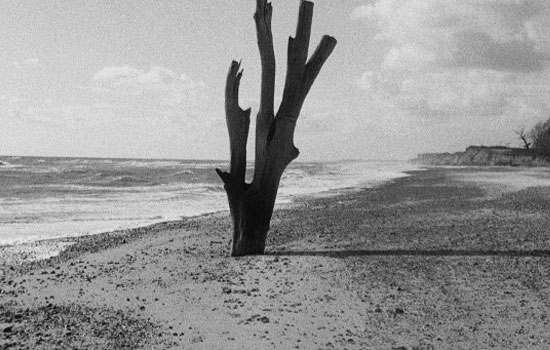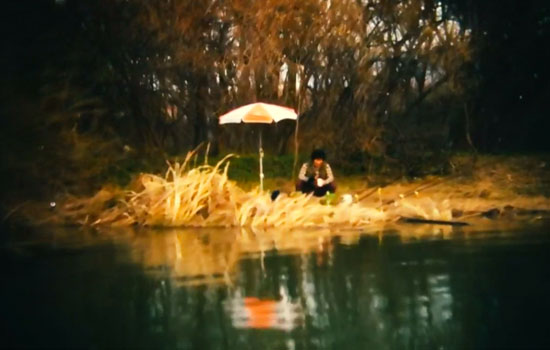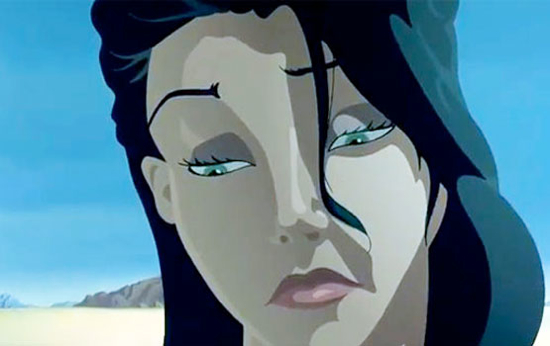Celebrating its sixth edition, Flatpack Festival grew from a series of nights hosted by a couple named Ian and Pip in The Rainbow pub: a dark, wooden rock bar at the top of Digbeth High Street, then under the ownership of Fuzz from Bentley Rhythm Ace. Their night was called 7 Inch Cinema, beginning with local shorts and international curiosities before ramping things up to confront audiences. Pip explained this from comfort of the well-lit Custard Factory, also on Digbeth High Street, but more modern than The Rainbow and closer to the coach terminus and Moor Street train station.
The Custard Factory (also home to Supersonic festival) isn’t just a whimsically named hub for Birmingham’s artistic community: it’s actually an old custard factory, redeveloped by a multimillionaire philanthropist named Benny who, apparently, keeps the complex running on his own dime. In the past six years his patronage has, I’d imagine, allowed Flatpack a degree of freedom from the commercial pressures faced by smaller festival venues such as Vivid and Ikon Eastside, which run under threat of closure due to budget cuts. Flatpack has brought five day’s worth of cinematic adventure to Birmingham every year since 2006. This year Pip has been able to take her hands off the reins and enjoy the event as a fan while she pursues a career in midwifery and healthcare. "It’s not that different to running a festival," she says. "Months of effort to create this thing, this independent entity with a life of its own." Back in the early days the turning point, in terms of the films they showed, came with a short about deaths in Nazi Germany. The film’s name is lost to memory but Pip remembers the punters pausing as they witnessed people forced into a van with a hosepipe attached to the exhaust. The pipe was fed back into the van, which then drove round in circles.
There’s a second-hand notion saying that in the secular world rock shows are places of worship, offering the same function as the boisterous Baptist church services of the American Bible Belt. If this is true cinemas offer the quiet contemplative space of small cathedrals. At a rock show you get involved; at the cinema you try not to interrupt. This was nowhere more evident than before Grant Gee’s film essay Patience (After Sebald), which explores the German-born author WG Sebald’s life in Suffolk. His best-known book, The Rings Of Saturn. documents a walk around Norwich and the East Anglian coast, drifting into memory and reminiscences, skirting around the horror of the Holocaust and World War II. Like the author, Patience… proceeds by degrees, taking time to show the locations discussed in the writing, mixing passages from the narrative with contributions from writers and artists. The unobtrusive ambient soundtrack comes from Leyland Kirby, contributing as The Caretaker.
In literary circles Sebald encourages a tone of quiet and profound appreciation. In the documentary his penetration and depth see him commended as writing ‘the best kind of journalism you can imagine.’ It occasionally does what the books cannot, offering fades between photos to show similarities and associations. A picture of fishmongers standing tall amidst a floor full of captured haddock fades into a woodland scene of trees standing tall with the ground full of dead bodies. The contributors are shown as talking heads only for as long is necessary to identify them. Their faces fade behind shots of the town and copses. Sebald was compelled by the presence of comminuted substances, of particles and dust. He explored receding shorelines and the beached wooden limbs of the Covehithe cliffs. Theatre director Katie Mitchell raises the concept of the Zone and Andrei Tarkovsky’s Stalker, saying that Sebald rendered parts of Benacre Broad as magical and charged as Tarkovsky’s Estonia. A small segment looks at Edward Fitzgerald’s translation of Omar Khayyám’s Rubáiyát, but there a few signposts to any other writers; no real effort to place Sebald in a constellation linking him, thematically and technically, to Kurt Vonnegut or Ryszard Kapuściński. But the film encourages identification with a mood, an attitude, a way of seeing – showing that with Sebald it’s important not to exhaust your interest by rushing.

Most of Flatpack’s venues – 18 or so – have only short walks between them, though movies at the £15 million Mac mean a £7 cab out of town towards Edgbaston. The festival’s selections include music doc Lawrence Of Belgravia (read tQ interviews with its star and director), Aki Kaurismäki’s latest Le Havre and the Iranian feature This Is Not a Film. Due to receive a UK theatrical release at the end of this month, the latter arrives with the risk of being overshadowed by its own back story: the film that had to be smuggled out of Iran on a USB key hidden in a cake. Unfortunately it shows no shocking exposés of official Iranian censure, but simply documents Jafar Panahi’s time under house arrest for filming without a permit. The director is irrepressible, describing the film he would make if only he had the freedom to direct. We see him trapped in domestic stasis, conversing with lawyers on speakerphone, lumbering around a spacious apartment wearing a black t-shirt. The whole show is cast in a kind of sub-Matrix green, a nightshot-lite which feels too consistent and aesthetic to have been spontaneous or even necessary. The Quietus’ full review captures the work’s poignancy, impact and political significance, but in Birmingham it felt like an outlier. My annoyance amounted to a basic conflict with the title, that left me puzzled as to how much knowledge the film presupposes. It’s brilliant that something made indoors can demolish the fourth wall, though the thought occurs that there might now be fifth or sixth walls consisting of knowledge drawn from continual exposure to televised news, and what we know about the process of filmmaking itself. In that sense, with political news only a click away, This Is Not a Film depicts something unique. Despite its convolutions it’s a story you will hear nowhere else.
The Korean short Night Fishing is also aware of its own construction, because it was filmed using an iPhone. Director Park Chan-Wook, best known for Oldboy, teamed up with his brother to make a 30-minute piece beginning with a music video, which segues into an acted sequence with a hiker at the waterside. The film is immediately striking and beautiful, the camera capturing the countryside with cinematic depth of field, the glare from the sunshine creating a kind of instant nostalgia, like Instagram photos. After dark, though, the hiker is fishing and captures a lifeless body, comically unable to unhook and disentangle himself. While it suggests that anyone has the potential to create cinema on their phones, Night Fishing actually proves you need talent and a commitment to storytelling to make something worth watching. The iPhone is but one tool in Chan-Wook’s armoury. The sound design, for instance, is brilliant, a world away from the rattling tin can tones of internal mics. We’re sure to see many more iPhone films in the future, but this one is definitely worth catching on the big screen.

The time spent wandering between Birmingham’s venues seemed compressed and a little rushed in comparison to the stretched and twisted journeys of the films. A festival like Flatpack offers so many screenings that you settle on one at the inevitable expense of another: watching Patience… meant missing The Icebook, an intricate stage show for an audience of 10, while Night Fishing began at the same time as the Panopticon audiovisual party with Brooklyn band White Hills. I’d signed up for an event named Outer Sight: Over Night, described as being for only the truly foolhardy, for people who were willing to have their dreams tampered with. The hyperbole was exciting but I had a bit of a wobble before leaving London. Rejecting a hotel to sleep in warehouse on the cheap side of town seemed foolish. And Pip was surprised when I mentioned it. She whistled and said , "Oh you’re going to that thing? It’ll be a real head-shredder."
"Head-shredder ?" I asked.
"Head-shredder," she said. "You can use that phrase if you like."
I assured her I would. I found the venue, The Edge, after dark, by which time any worries had dissolved. A mid-sized ground floor warehouse, decked out with large screens and sheets showing an all-night series of expertly mixed shorts, left-field assemblages and animations including The Jetsons and Destino, the collaboration between Walt Disney and Salvador Dalí released in 2003, 58 years after its inception. The night promised irregular interventions from Birmingham’s Friction artists and the hallucinatory, psychedelic edge that’s meant to come with sleep deprivation. But I was reminded of a line from some Martin Amis book: ‘Exhaustion really is the best drug on the market.’ I flopped out on an inflatable mattress, being woken only once to be given sweet chai and a cardboard Aztec mask with 3D eye-pieces, the better to watch hands reaching down from the ceiling screen. In the morning everyone was taken up to the roof to see the sun rise over Digbeth. All the films aside this is an abiding memory: a collection of strangers standing together in silence, simply watching the sky. It was a grey sky, right enough, the sun dull behind a gauze of cloud. But it was a good feeling, and a chance to reflect. Parts of the area are earmarked for future development, but events like Flatpack are slowly generating their own history. The festival feels like an essential component in Birmingham’s cultural life, bringing new talent and the city itself to light.
For more information check the Flatpack Festival website.



